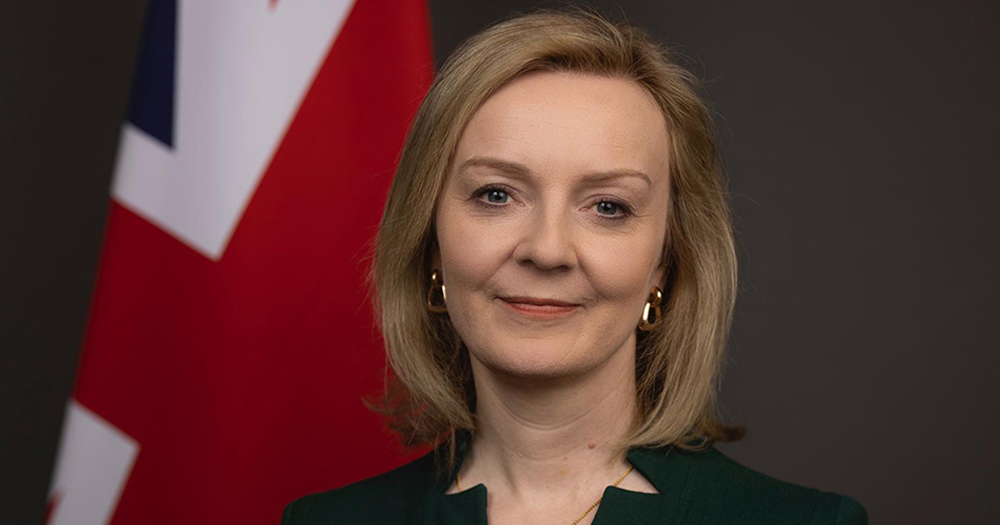LGBTQ+ issues, particularly regarding the rights of Trans folks, have been at the centre of a hot debate during the Tory leadership race which ended on September 5 when Liz Truss was finally confirmed as Britain’s new Prime Minister.
Since former Prime Minister Boris Johnson handed in his resignation earlier in July, the political debate in the UK has focused on the Conservative Party leadership race. After beating rival Rishi Sunak, Truss was confirmed as the next British Prime Minister, taking office today, September 6, after visiting the Queen in Balmoral.
After her predecessor is said to have established “atmosphere of hostility for LGBT+ people” while in office, many are wondering what Liz Truss as the next British Prime Minister will mean for the LGBTQ+ community in the country. According to the information gathered by TheyWorkForYou, a website that monitors lawmakers’ voting records, as an MP she has never voted against LGBTQ+ rights.
It would look like positive news for the queer community in the UK, but is it really? We had a look at Truss’s track record on some of the main LGBTQ+ issues, as well as the stances of her likely new cabinet, to find out what her nomination entails.
I am honoured to be elected Leader of the Conservative Party.
Thank you for putting your trust in me to lead and deliver for our great country.
I will take bold action to get all of us through these tough times, grow our economy, and unleash the United Kingdom’s potential. pic.twitter.com/xCGGTJzjqb
— Liz Truss (@trussliz) September 5, 2022
Marriage equality
Truss has consistently voted in favour of marriage equality, including when the law was passed in 2013 and when it was extended to Northern Ireland in 2019. In 2014, she also voted in favour of extending making same-sex marriage available to armed forces personnel outside of the UK.
However, there is speculation that Nadine Dorries will retain her role as Secretary of State for Digital, Culture, Media and Sport under Truss’s leadership and she was among those who voted against marriage equality in 2013, though she later called the vote her “biggest regret”.
Similarly, Thérèse Coffey, who was campaign manager for Truss in the Conservative Party leadership election, voted against marriage equality both in 2013 and 2019.
#LizforLeader pic.twitter.com/T4B3EARxCI
— Thérèse Coffey (@theresecoffey) July 11, 2022
Conversion therapy
During her time as Equalities minister, Truss said she was “determined” to ban so-called conversion therapy. However, the practice still remains legal in the UK and Truss oversaw the government’s decision to exclude Trans people from the protection of a planned ban.
Moreover, she confirmed earlier in August that Kemi Badenoch, a minister who was condemned for “utterly failing” the LGBTQ+ community, was in line for a top role in her Government. Badenoch faced repeated backlash over her role in delaying the legislation that would ban conversion therapy and it has been reported that she secretly met with LGB Alliance, an anti-Trans lobby group, and facilitated a meeting between an organisation that advocates for conversion therapy and government officials.
https://twitter.com/discount_Ripley/status/1547620553430667266?s=20&t=zpfi8oPk-Qr7uwtcfhhuYg
Gender recognition
Truss’s personal stance on gender recognition seems to follow in the footsteps of the anti-Trans views of her predecessor. She repeatedly scrapped proposals to reform the Gender Recognition Act which would have allowed “self-identification”, removing the barrier of having to go through a medical approval process for Trans people before being able to change their gender in official documents.
It has also been predicted that Truss’s cabinet will include former rival in the leadership race Suella Braverman who repeatedly attacked Trans rights and was called out for suggesting that Westminster should intervene to block Scotland’s Gender Recognition Act. During her bid for the Conservative leadership, she said: “We need to get rid of all of this woke rubbish and get back to a country where describing a man and a woman in terms of biology does not mean that you’re going to lose your job.”
https://twitter.com/DexxMarshall/status/1567128594450636802?s=20&t=zpfi8oPk-Qr7uwtcfhhuYg
Trans women in sports
During the hustings, on August 25, Truss, echoed by her rival Sunak, claimed that she did not believe that Trans women are women.
Moreover, Nadine Dorries has been very vocal about banning Trans athletes from playing in the women’s category in sports, saying that allowing Trans women to compete alongside cis players is “inherently unfair”. Earlier in June, she spoke to some sports representatives saying: “I have made my position absolutely clear: I expect sporting bodies to follow the policy that competitive women’s sport must be reserved for people born of the female sex.”
All of this considered, it seems that having Liz Truss as the new British Prime Minister might not represent a huge shift for the LGBTQ+ community in respect to what was happening under Boris Johnson’s leadership.
© 2022 GCN (Gay Community News). All rights reserved.
Support GCN
GCN is a free, vital resource for Ireland’s LGBTQ+ community since 1988.
GCN is a trading name of National LGBT Federation CLG, a registered charity - Charity Number: 20034580.
GCN relies on the generous support of the community and allies to sustain the crucial work that we do. Producing GCN is costly, and, in an industry which has been hugely impacted by rising costs, we need your support to help sustain and grow this vital resource.
Supporting GCN for as little as €1.99 per month will help us continue our work as Ireland’s free, independent LGBTQ+ media.
